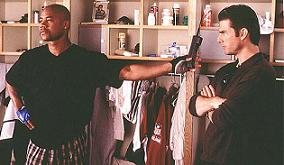 Street and Smith's Liz Mullen reports that the NFLPA's Board of Player Representatives (which is comprised of this Executive Committee) has decided against lowering the maximum agent fee from 3 percent to 2 percent for most player-agent agreements, although did lower the fee for franchised and transitioned players. (Mullen, "NFL Union Keeps Maximum Agent Fee," Street and Smith's Sports Business Journal, Mar. 27, 2006 (registration required)). A number of players had advocated that the maximum fee be reduced for all contracts, contending that some players, and particularly new NFL players, unknowingly and hastily agree to the 3 percent fee without exploring other representation options (such as hiring a lawyer to do their contract representation on an hourly rate basis, or simply finding an agent who would agree to 2 percent). To illustrate this concern, Kellen Winslow Sr. recently opined that agents are duping young players into signing player-agent contracts with 3 percent fees:
Street and Smith's Liz Mullen reports that the NFLPA's Board of Player Representatives (which is comprised of this Executive Committee) has decided against lowering the maximum agent fee from 3 percent to 2 percent for most player-agent agreements, although did lower the fee for franchised and transitioned players. (Mullen, "NFL Union Keeps Maximum Agent Fee," Street and Smith's Sports Business Journal, Mar. 27, 2006 (registration required)). A number of players had advocated that the maximum fee be reduced for all contracts, contending that some players, and particularly new NFL players, unknowingly and hastily agree to the 3 percent fee without exploring other representation options (such as hiring a lawyer to do their contract representation on an hourly rate basis, or simply finding an agent who would agree to 2 percent). To illustrate this concern, Kellen Winslow Sr. recently opined that agents are duping young players into signing player-agent contracts with 3 percent fees:
Anyone who is paying 3 percent for contract negotiation I can tell you is being ripped off. [Eligible draft picks] decide to sign with an agent because agents have sold them a bag of goods of what they can do for them. All an agent can do for you at the combine is to run around and use your name so they can recruit other players.Winslow also argued that while many agents promise to help players secure loans, top draft prospects could save themselves the commission by simply going to a bank and easily obtaining a loan on their own.
Nevertheless, a group of agents convinced the NFLPA that a reduction in the maximum fee would prove disastrous to their practice and also severely impair their ability to provide players with certain services, such as training to prepare for the NFL combine and the NFL draft. But their persuasion only went so far, as the NFLPA passed a resolution that lowers maximum fees from 3 percent to 2 percent for franchised and transitioned players, and agreed to futher reductions when a player is franchised or transitioned a second and third time.
Rick Karcher has written extensively about player representation and agent fees. For a preview of his forthcoming article in the Willamette Law Review on that subject, check out his post from February:
As players' salaries keep increasing, so do the agents' fees because they are paid on a commission basis. Simply, the agent's fee far exceeds the legitimate legal work and negotiation involved with a player contract, and the players are essentially funding the solicitation expenses incurred by agents. With such a huge commission at stake, agents have an incentive to invest an incredible amount of time and resources in client solicitation. And many of the reasons or justifications typically cited for paying a fee on a commission basis in other industries are not applicable to the player-agent relationship.We look forward to Rick's law review article. And are players being duped by certain kinds of agents or do they simply lack personal responsibility in pursuing representation? Or both?





0 comments:
Post a Comment